|
|
|
|
"Art is the impression left upon the mind when all writing has been effaced." -Dr. Phil Brady
|
|
Insights from Etruscan Executive Director Phil Brady
|
|
|
Proud,
joyful, tender, valorous. These are the words that pass through the
mind of Gabriel Conroy, the protagonist of James Joyce’s story, “The
Dead,” as Gabriel descends the staircase from his successful speech at
his aunts’ Christmas dinner. With his beautiful wife Gretta on his arm,
he looks forward to the night at the Gresham Hotel, where his literary
labors will be rewarded.
And so we may feel today: proud of our accomplishment, joyful in our
abilities, valorous in our hopes, and tender toward our own literary
labors. Like Gabriel, we hope that our work as writers—the planning,
drafting, shaping and revising—are rewarded by friends, by readers, by
publishers and reviewers—by, might we dare to dream—the world.
But, as you may recall, when Gabriel’s carriage arrives at his hotel and
he and Gretta enter the well-appointed Georgian room, and he signals
the porter to snuff the candle, and he calls softly “Gretta dear,” his
thoughts of love and conquest are suddenly dashed and he is confronted
by a specter—Gretta’s memory of a lover from her past, a boy named
Michael Furey, who died long ago at the age of seventeen for love of
her. Conjured by a lamenting Irish ballad, “The Lass of Aughrim,” sung
at the festive party, the ghost of Michael Furey now stands between
Gabriel and his triumph. His hopes are thwarted, but with this ending, a
new story—one in which we ourselves are invited to partake—now opens.
Pride, joy, tenderness, valor—success is wonderful. But ultimately, it’s
predictable. All happy families, Tolstoy tells us, are alike, but every
unhappy family is unhappy in its own way.
Great writing never ends in triumph. In fact, great writing doesn’t
begin until our original intention has been snuffed out and we are
confronted with the ineffable specter of the other, the unintended, as
Gabriel is confronted with the presence of the dead.
This year we have witnessed in our presidential election the thwarting
of expected success on a global scale. Whatever your political views,
it’s hard not to think about the personal consequences of failing so
grandly in public. I think we know what Donald Trump is feeling—but what
about Hillary? For writers, failure is just so much more interesting
than success.
Yeats puts it this way in a poem called, “To A Friend Whose Work Has Come to Nothing.”
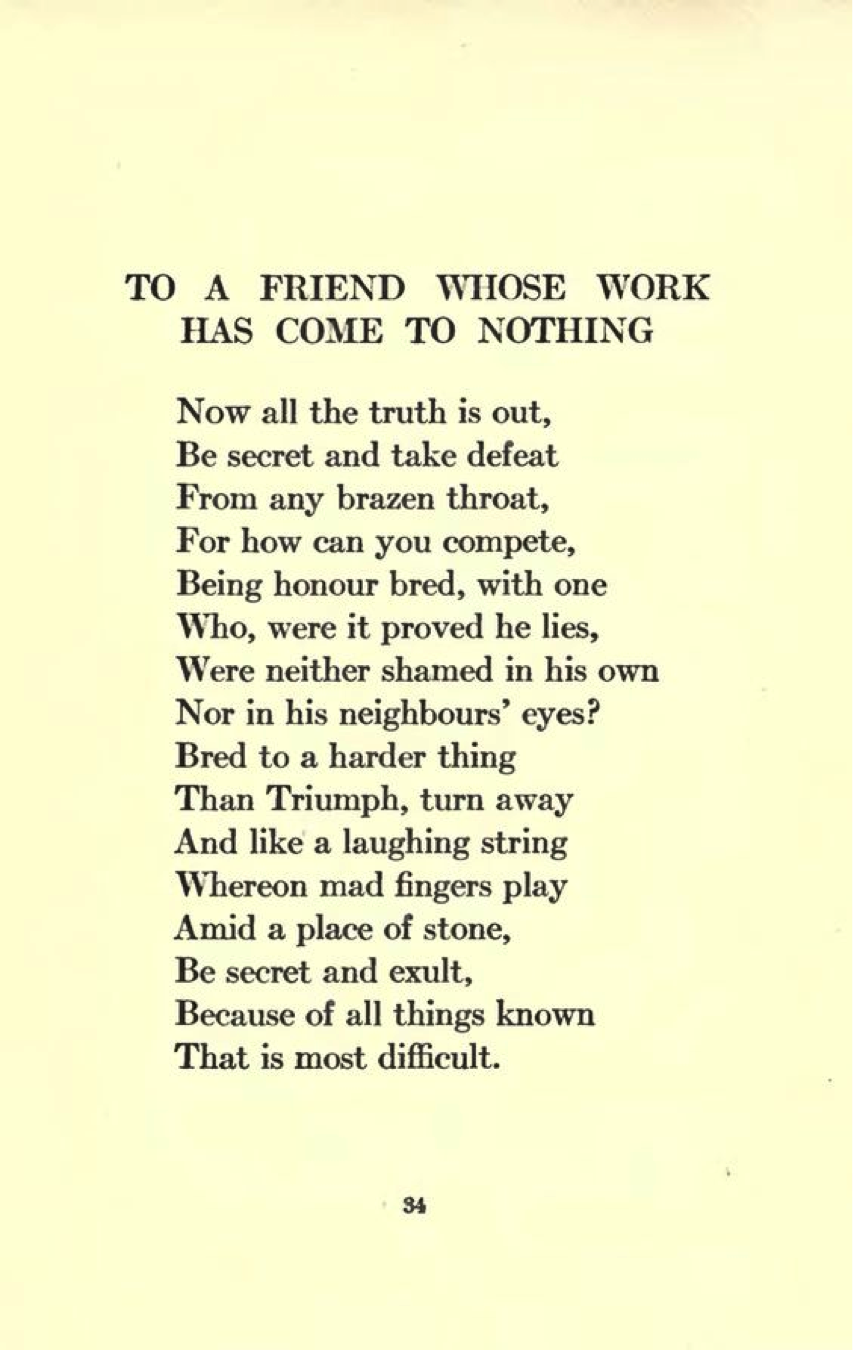
Amazing how Yeats unearthed the theme in the rhyme— “exult” and
“difficult.” I imagine him strolling the fields of Coole Park and
Ballylee, his boots rhythmically rustling the grass that glistened under
the slanting Galway sun, and tuning, in his mind’s ear, this sound
allegiance. “Exult/Difficult.” Poems (and all writing) don’t come out of
intention, but out of surrendering to the felicities of language: what
Finn MacCumhal, the mythic Irish hero, calls, “the music of what
happens.”
The difficult thing that Gabriel Conroy must accomplish is to put aside
pride, joy, valor, even perhaps tenderness, and exult secretly in deep
soul. When I say that writing begins with failure, I mean only that it
begins there—what happens next is what counts. Most people give up. I
think that those who make writing a life’s vocation aren’t necessarily
the most talented, they are merely the most willing to experience
profound and continuous defeat. As W.D. Snodgrass used to say, when
asked if someone should become a poet, “Not if he can be happy doing
anything else.”
The prevailing response to failure is resistance. And our response to
that response is also tinged with resistance. As teachers, coaches,
parents, bosses, what do we say?
“Try harder,”
“Pick yourself up by your bootstraps,”
“Push, push, push.”
“Resist.”
But, confronted with a specter of adolescent love from long ago, Gabriel
doesn’t resist. He doesn’t rage against his wife or against fate.
Instead Joyce tells us that “Generous tears filled Gabriel’s eyes.”
Thinking of Michael Furey’s passion, he says, “He had never felt like
that for any woman, but he knew that such a feeling must be love.”
Today, I do not praise resistance. I say we must immerse ourselves in
failure. We must drown in failure. We must fail exultantly,
extravagantly, repeatedly.
Writing does not aspire to mere success. We cannot write our way into
deep soul. There is always a yearning space between our feelings and the
alphabet that encodes thought. For me, walking like Gabriel Conroy into
the suburbs of old age, the irony is that Gabriel’s confession of
failure is the most refined and intense feeling: his life-long love for Gretta is far deeper than Michael Furey’s youthful passion.
In fact, great writing may not be passionate at all. It may be that for
all our pride and joy and valor and tenderness, we create only rough
drafts, and it is not until they pass through the phantasmagoria of the
revenant that they are fully realized. For all our labors, I’m here to
say, at the pinnacle of success, that writing is not a personal
activity, it is a soulful receptivity. Art is the impression left upon
the mind when all writing has been effaced.
As darkness falls, Gabriel does not turn toward Dublin’s lamp
light. He yields his pride, joy, valor and tenderness to the ghost
of Michael Furey standing under a dripping tree. “His soul had
approached that region where dwell the vast host of the dead….”
Today, as for Gabriel, the time has come for us to set out on our
journey westward. Gabriel’s journey takes him toward the wild Atlantic
surf, towards his wife’s secret past, toward the poor and forgotten and
oppressed, toward sleep, toward death. Our journey is a soul-nurturing
voyage, one that cannot be forecast or controlled. It demands that we
allow every detail and nuance and feature of the world to pass before
our eyes, and at the same time allow the chimera to fade to a
snowdrift. It requires us to attend, beneath the markings we make
on page or screen, to the thrum of sleep, of death, of community, of
wonder.
“Yes, the snow was general all over Ireland. It was falling on every
part of the dark central plain, on the treeless hills, falling softly
upon the Bog of Allen and farther westward, softly falling into the dark
mutinous Shannon waves.”
Today, I invoke the ghost of Michael Furey to touch us all, softly
murmuring every particular note, whispering into being each minute
shard, casting every shade and nuance, and at the same time sinking
beneath, by the agency of rhythmic utterance, to the powerful unity
without which our writing is mere words.
“It was falling too on every part of the lonely churchyard on the hill
where Michael Furey lay buried. It lay thickly drifted on the crooked
crosses and headstones, on the spears of the little gate, on the barren
thorns. His soul swooned slowly as he heard the snow falling faintly
through the universe and faintly failing, like the descent of their last
end, upon all the living and the dead.”
Dr. Phil Brady delivered this commencement address at the conclusion
of the Wilkes University Graduate Creative Writing Program Weekender in
Mesa, Arizona (June 2016).
|
|
New Releases from Etruscan
|
|
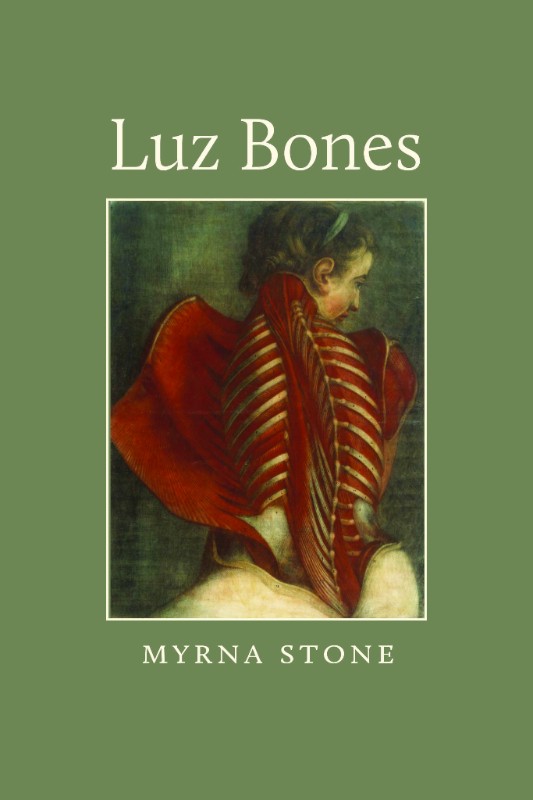
|
|
Luz Bones by Myrna Stone
We’re pleased to publish another poetry collection from Myrna Stone,
two-time Ohioana Poetry Book Award Finalist. Stone has received praise
from Bruce Bond, author of The Other Sky, naming Luz Bones as “a deeply moving and masterful book.” Luz Bones
is a collection of forty-six formal poems, including sonnets, triolets,
and other rhymed poems that run chronologically to tell the narratives
of real people through time and history. Among them are the famous—such
as Martin Luther, Hans Christian Andersen, John James Audubon, the
original Siamese twins, Chang and Eng Bunker, and Mae West, as well as
the more obscure such as Annie C. and H. L., who relate the joy,
sadness, and terror of their “near-death” experiences and their
aftermath. Jeff Gundy, author of Abandoned Homeland and Somewhere Near Defiance
says, “In Stone’s skilled hands, the dramatic monologue takes us into
many unexpected minds, bodies, and places…as true as they are real.” The
wild, intense, and fiercely crafted sonnets and other poems in Luz Bones taken together read like an epic, a journey through time and the psyche that is both novelistic and lyrical.
|
|
|
Outreach in Youngstown, OH
|
|
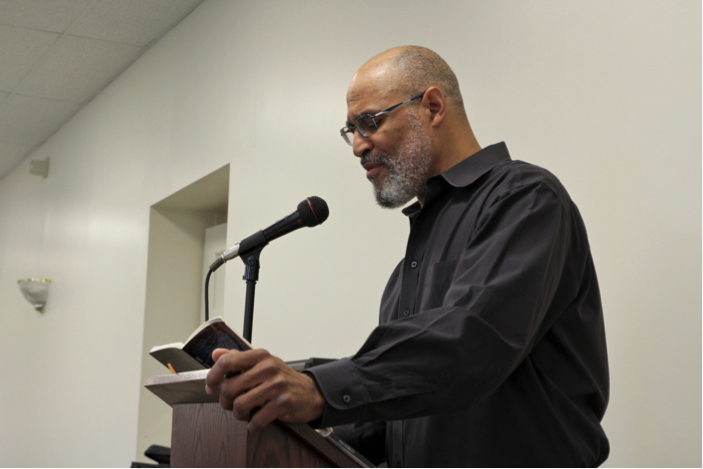
|
|
Tim Seibles reads from One Turn Around the Sun at the ACTION Fellowship Breakfast on March 28.
|
|
From March 27 to 29, Tim Seibles, Poet Laureate of Virginia and author of the collection One Turn Around the Sun
visited Youngstown, OH as part of a three-day outreach program
coordinated by The YSU Poetry Center and Etruscan Press. The Etruscan
Outreach Program, in partnership with the YSU Poetry Center, brings
acclaimed authors to work with under-served students in area high
schools, increasing the literacy of the students and offering a general
appreciation for the literary arts.
During Seibles’ stay in Youngstown, he visited East High School, Choffin
Career & Technical Center, Youngstown Early College, and Austintown
Fitch High School. Students at all four schools received copies of One Turn Around the Sun,
and a study guide corresponding with the book. At East High School,
Seibles awarded three cash prizes for a one-page writing contest.
Winners were presented with an Etruscan Press tote bag containing
Etruscan titles, while honorable mentions were awarded Barnes &
Noble gift cards.
|
|
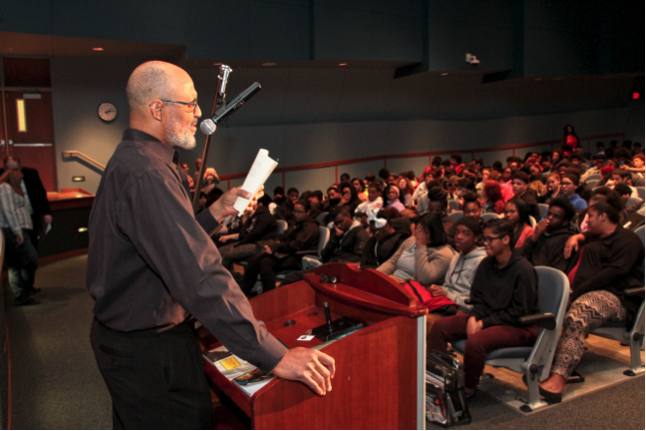
|
|
Seibles reads from One Turn Around the Sun at East High School in Youngstown, OH on March 27.
|
|
Monday morning, Seibles was interviewed
by Tim Francisco of WYSU, Youngstown State University's public radio
station, in which he discussed his motivations as a poet. This interview
occurred on campus before his meeting with students
at Youngstown Early College.
Seibles also participated in two public readings in Youngstown. The
first, held at 7 p.m. on March 27 at the Tyler Mahoning Valley History
Center, was co-sponsored by the Mahoning Valley Historical Society and
Etruscan Press, and was titled “Morning Where You Are: The Poetry of Tim
Seibles.” Monday’s program featured entertainment by the Youngstown
Connection, a singing and dancing group comprising local high
school students that has toured internationally.
On Tuesday March 28, Seibles conducted a public reading at the annual
ACTION Fellowship Breakfast at St. Edward Catholic Church, and was
joined by local poet and rapper Adrian Orlando Watson and treated to
a performance by local saxophonist Minister Sandra
Miles. (ACTION stands for Alliance for Congregational
Transformation Influencing Our Neighborhoods, which focuses on a range
of social issues, including crime prevention, education, immigration,
and health and wellness.) The breakfast concluded a weeklong
commemoration of the International Day for the Elimination of Racial
Discrimination, which the United Nations proclaimed in 1966 to
memorialize the Sharpsville massacre, in which 59 people were killed and
hundreds injured while demonstrating against South Africa’s Apartheid
regime on March 21, 1960. Following his reading, Seibles signed copies
of One Turn Around the Sun for the community.
|
|
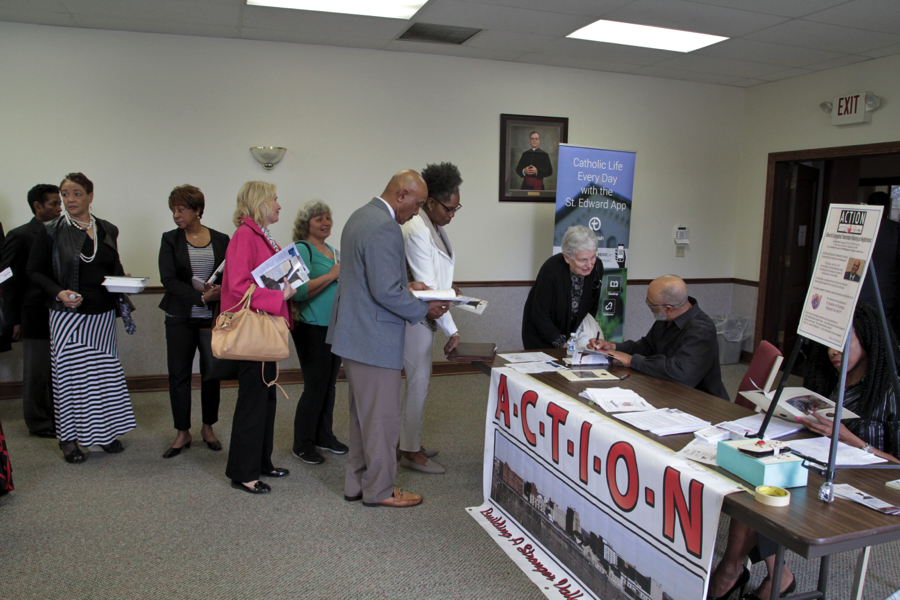
|
|
Seibles signs copies of One Turn Around the Sun at the ACTION Fellowship Breakfast on March 28.
|
|
|
For more information about the Etruscan
Press/ Youngstown State University Poetry Center outreach program,
please visit our website.
|
|
About Etruscan Press:
Housed at Wilkes University and partnering with Youngstown State
University, Etruscan is a non-profit literary press working to produce
and promote books that nurture the dialogue among genres, cultures, and
voices.
For the latest Etruscan events, please visit our website.
|
|
|
|
|
|
|
|
|